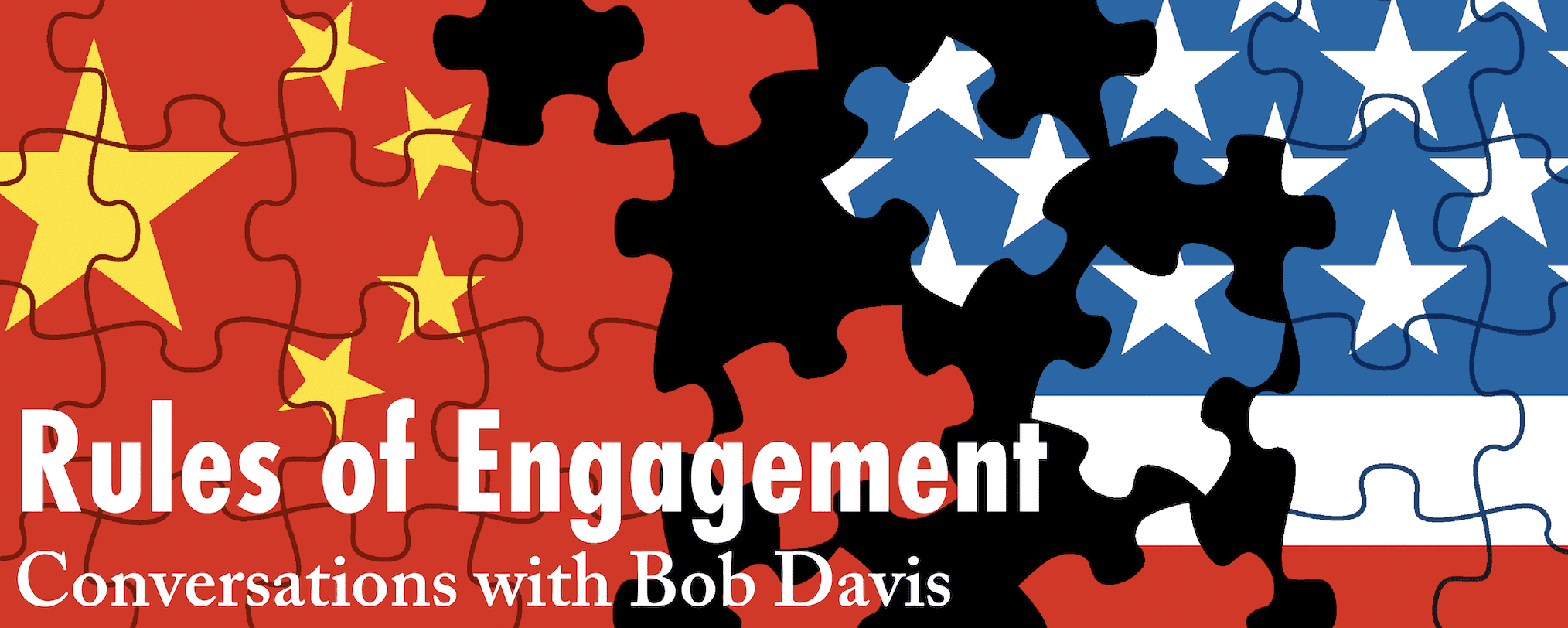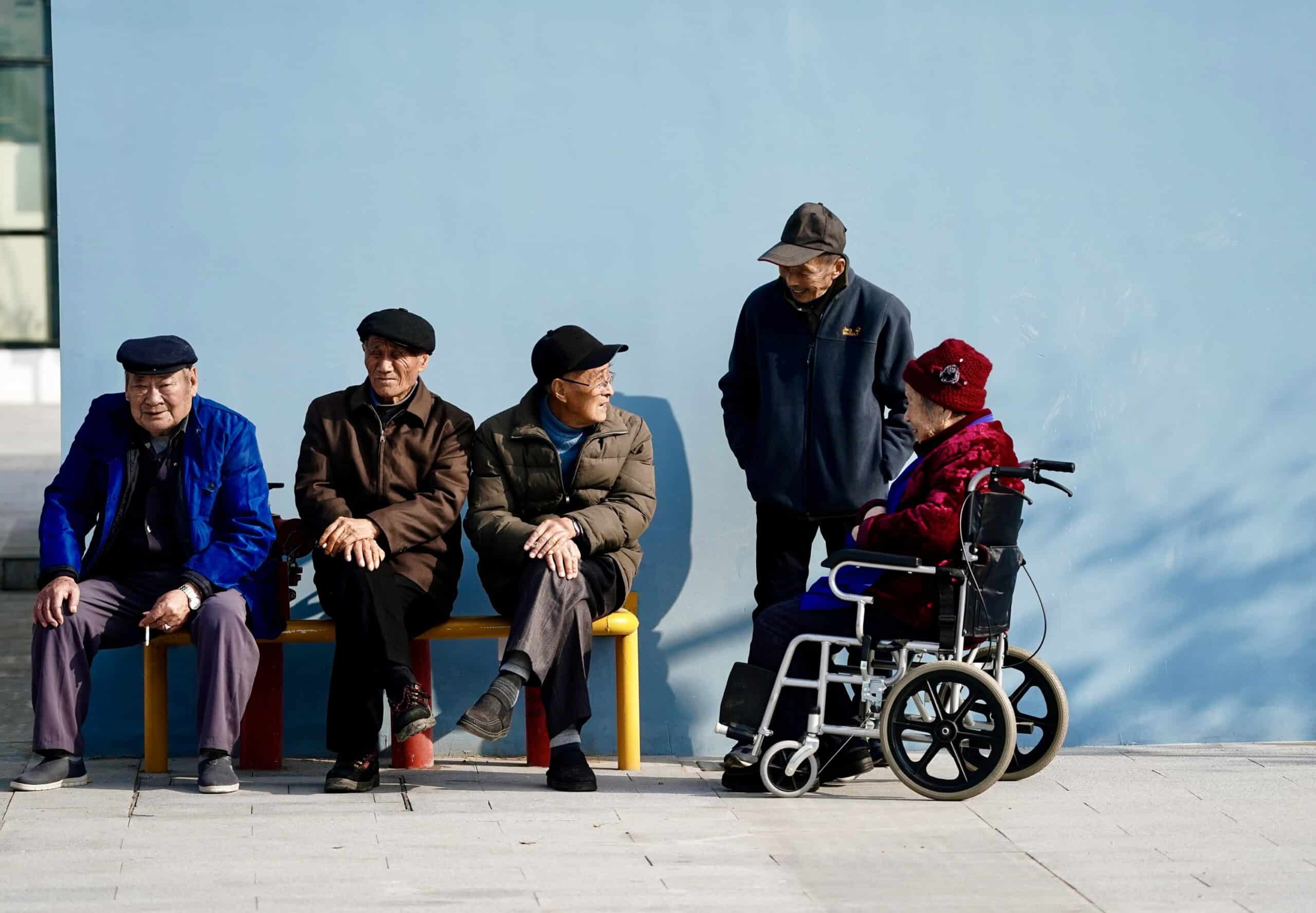Keith Krach was a business veteran but a novice to government when he joined the Trump administration in June 2019 as under secretary of state for economic growth, energy, and the environment. At age 26, he was named a vice president of General Motors, where he helped set up GM’s robotics venture. Later he co-founded Ariba Inc., a pioneer of business-to-business e-commerce, and went on to become chief executive of DocuSign Inc., which digitized document signing. In government, Krach was an advocate for what he calls “tech statecraft,” which in practice meant using sanctions, subsidies, and alliances to try to keep the U.S. ahead of China technologically. He also was the highest-ranking State Department official in years to visit Taiwan – a trip that strengthened U.S. ties to Taiwan and prompted Beijing to send jets to cross the median line between the island and the mainland. After leaving government, he started the Krach Institute for Tech Diplomacy at Purdue University to try to boost U.S. technology efforts internationally. This interview is part of Rules of Engagement, a new series by Bob Davis, who covered the U.S.-China relationship at The Wall Street Journal starting in the 1990s. In these interviews, Davis asks current and former U.S. officials and policymakers what went right, what went wrong and what comes next.

lllustration by Kate Copeland
Q: Back in 2001, when you were chief executive of software company Ariba, you were expanding into China. You called doing business in China a ‘winning proposition.’ Why did your view change?
A: I’ve been going to China since 1981, and I’m a lover of Chinese history, culture, people – definitely the food. When I grew up in Ohio, I was welding at the age of 12 in my dad’s five-person machine shop. Later, I could see how China’s weapons of mass production gutted the heart of the U.S. economic engine.
My last trip to China was when I was running DocuSign. We were up to about 500 million users, and we were in every major country except for China.
I went on a two-week listening trip around December 2017 to investigate if we should enter the China market. I heard directly from seven Chinese Politburo members about their Made in China 2025 plan. I saw their drone-swarming technology. This was also the first time I heard about the One Belt, One Road program and it looked like a military supply chain to me. I could see how China’s competitiveness had been amped up into a new form of aggression under Xi Jinping.
As I was flying back on the plane, I said to my wife, ‘All I know is the guys with the best technology win the war. I wonder what the guys in Washington think about this.’ One week later, I went to D.C. to tell them what I saw from a businessman’s perspective. [Later], I was asked to run U.S. economic diplomacy.
Also, at Ariba, when we invented B-2-B for e-commerce, the guys from Alibaba took a bunch of our intellectual property.
When you say ‘took,’ what do you mean?
In essence, they took many of our ideas. I’ll never know if they got any code, but we could tell by looking at their architecture. The user-interface looked the same — a lot of stuff. I went over there a couple years later, and I was with some Chinese businessman, and I said, ‘Look, when are you guys going to stop stealing our stuff?’ And they just kind of grinned and had a kind of a puzzled look on their face.
They said, ‘You know, we really don’t have a word for stealing in Chinese. If it’s there, we just take it. It’s your guys’ fault for not protecting it.’ [Editor’s Note: there is a word for ‘steal’ in Chinese, tou 偷]
The other thing I saw as a vice president of General Motors was that if you build a plant in China — because you’ll only get market access if you do that or start a joint venture — you’re not just handing them the blueprints. You’re giving them the process engineering knowhow. You’re teaching their people to come back and compete against you.
So, you saw these downsides, but you also presumably saw enormous opportunities there too.
Yeah, for sure. I was like everybody else. I believed that capitalism would equal democracy there. They obviously proved that wrong. Now I really believe that we’ve got to take off those rose- colored glasses and not treat them the way we hoped they would be, but how they truly are.
When you started at the State Department in June 2019, the Trump administration had taken a very tough stance toward China. What difference did you hope to make?
My mission was to develop and operationalize a global economic security strategy to drive economic growth, maximize national security, and combat China’s economic aggression. Both sides of the aisle truly understand that our rivals are playing the long game. They’re playing for keeps and they fancy themselves as masters of four-dimensional cultural, diplomatic, economic, and military chess. Worst of all, they believe they’re above the rules and have little respect for human rights, intellectual property, international law, the environment, and sovereignty of nations.

At my confirmation hearing, I was asked by Senator Chris Coons [Democrat, Delaware] what my strategy would be to combat China’s economic aggression. I said my strategy would focus on the U.S.’s three biggest areas of competitive advantage: unifying and rallying our allies, leveraging the innovation resources of the private sector, and amplifying the moral high ground of democratic trust principles.
Both sides of the aisle were hitting the panic button because it looked like China’s master plan to control 5G was going to happen. Their most important company, Huawei, was the backbone of their surveillance state that enables genocide. It looked like Huawei was going to run the table. My predecessors had been going around and banging on tables in different countries and saying, “Don’t buy Huawei.”
Well, in February 2020 Huawei announced 91 5G contracts around the world, and 47 were in Europe. That’s when our team got the authority to act. I brought in 12 folks from Silicon Valley, results-oriented executives, entrepreneurs and technologists. I also brought in the dean of engineering from Purdue University, Mung Chiang [as a technology adviser to the State Department]. We combined them with some of the greatest foreign service officers in the world. It was magical.

I said, “Look, why don’t we treat these countries and telcos like customers. Nobody likes to be told what to do. The customer’s always right.” In order to get somebody to partner with you, you need a value proposition. That was the beginning of the strategy of building the Clean Network Alliance of Democracies, that defeated China’s master plan to control 5G.
[Editor’s note: The Clean Network was a Trump administration initiative to build a coalition of allies that agreed on a comprehensive approach to safeguarding sensitive information from so-called malign actors, including China.]
We built an alliance of democracies in 60 countries, representing two-thirds of the world’s global GDP, 200 telcos and a host of industry-leading companies. We based that on what’s now known as the trust doctrine to offset authoritarian regimes’ power principle of concealment, co-option, coercion, intimidation, and retaliation.
I’m all for communicating with China and finding those areas [where we can cooperate]. But the question is, can you trust Xi? Nobody trusts him.
The strategy leverages things that really define trust — things like integrity, accountability, reciprocity, transparency, respect for rule of law, respect for property and the sovereignty of nations. These are things that we honor in the free world and authoritarian regimes do not. They actually use it against us. The trust doctrine and the Clean Network Alliance of Democracies, in one jujitsu move, flipped them on their head. We weaponized the very principles that protect our freedoms.



In my first 60 bilaterals with my foreign counterparts I’d say, “Hey, how’s your relationship with China?” And they would say, “Well, they’re really important trading partners.” It seemed like all the time, they’d then look both ways, as if somebody’s in the room, lean in and say, “But we don’t trust them.”
That rang bells in my head because the year before I was standing in front of all our DocuSign employees and customers at our user conference, and I’d said, “We’re not in the software business, we’re in the trust business. We deal with people’s most important documents. Those are the ones you sign.”
Trust is the most important word in any language. You buy from people you trust. You partner with people you trust. You do business with people you trust and so on. That was our strategic positioning.
When you were trying to convince these countries and telcos not to sign up with Huawei, you had to offer them an alternative. How did you deal with that?
The alternative was Nokia and Ericsson and Samsung.
Sometimes governments would say, “You’re just trying to push your own products.” And I would say, “Au contraire. We don’t have products in this area.”
[Editor’s note: U.S. companies had given up the telecommunications hardware business. The market leaders, aside from Huawei, were Nokia Corp. of Finland, Ericsson of Sweden, and Samsung Electronics Co. of South Korea.]
Our first objective was to defeat China’s master plan to control 5G because that would mean they would control all the communications, autonomous vehicles, sanitation systems, utility grids, the Internet of Things, and manufacturing processes.
The Chinese government was subsidizing Huawei, which was literally almost giving away its products for free in a lot of countries. We lifted their pricing umbrella [by convincing telecommunications companies and governments not to use Huawei equipment] so that other companies could make a profit. That’s why Cisco, Microsoft, Dell, and other companies in the world are coming in. We knocked down Huawei’s 91 deals to probably less than a couple of dozen.
You also used export regulations to deny Huawei the most advanced chips in the world.

One of the things that we knew coming from Silicon Valley is that in a rapidly changing market, everybody wants to go with the leader. Leadership is not necessarily determined by size; it’s determined by momentum. The strategic imperative was to take away Huawei’s momentum and replace it with ours. One of the key things was to come out strong with an opening gambit to put them back on their heels.
That’s where the export controls on Huawei semiconductors came in. We used our dominance in the software-tool-and-design area and in the machine-tool area to our advantage. We could literally just cut them off at the pass [by denying China access to technology in those areas].
The sense of urgency enabled us to use 5G as a beachhead and develop an enduring model for all areas of techno-economic competition. That’s now being used by the Biden administration. So, this represents a bridge between a Republican and a Democratic administration.

We built an alliance of democracies. That’s been carried on today with what the Biden Administration calls the Alliance for the Future of the Internet Declaration. [Editor’s note: In April 2022 a group of 60 nations signed a statement calling for a code of practice to keep the internet open, free, and secure.]
Was the goal of the U.S. government to destroy Huawei?
The number one goal was to lift Huawei’s pricing umbrella so fair competition could come in. The second goal was to create an enduring model that you could use for all. The third goal was really to show that you could build an alliance of democracies.
Some critics are skeptical of U.S. government claims that Huawei is using its network to spy for the Chinese government. What’s the best evidence?
One question is why are they always giving their equipment away in remote areas like the middle of Wyoming? Is that a moneymaker? That happens to be a very strategic air area with a lot of things on the ground too. [Editor’s note: Minuteman III intercontinental ballistic missiles are located in Wyoming and other western states.]

Huawei also built the African Union’s building for free and wired that thing up. [Editor’s note: In 2020, Reuters reported that cyber researchers suspected that Chinese hackers were siphoning surveillance footage taken in the AU’s building in Ethiopia, which used Huawei 5G servers.]
Huawei used to say there are no backdoor agreements. That was a red herring because they’re updating their software every day. They could change their software at any time. They would also say, “Oh, you can review our source code.” Well, source code on 5G would fill up your house with paper. You couldn’t review it all. We knew what they were up to.
China leads in some technologies. Isn’t it in the U.S. interest to tap into the best research effort in China? How can we do that while institutionalizing sanctions?
The world is experiencing an epic struggle between the forces of freedom and authoritarianism. After eliminating any form of competition, Xi bypassed the two-term limit for president and was crowned ruler for life with unlimited powers.
I’m all for communicating with China and finding those areas [where we can cooperate]. But the question is: Can you trust Xi? Nobody trusts him.
We went back and we looked through all the agreements we signed in the last 40 years. China didn’t honor one of those that didn’t suit its purposes. If you don’t believe that, ask the people in Hong Kong. Xi is not afraid to lie. These guys are the master head fakers.
Let’s talk about the Chips Act and subsidies for semiconductor makers to manufacture in the United States. You played an important role in pushing for it. What impact do you think it will have?
The analogy I use is the Apollo program. In today’s dollars, Apollo cost $150 billion. And the result was not just going to the moon, but America’s leadership in microelectronics, software, computing, and the aerospace business.

The other part of the Chips and Science Act was the Endless Frontier Act that we presented to Senator Schumer [Democrat of New York] and Senator Young [Republican of Indiana] in November 2019. It had $200 billion of federal research funding for 10 national security tech sectors which included things like semiconductors, 5G and biotech.
We showed that the amount spent on R&D in this country — not just from the government perspective but from a corporate perspective — was going down, down, down. We showed them if we could get this funding, we could get matches from the private sector and our closest technological allies. We could get the funding up to anywhere between $500 billion to $1 trillion.
[Editor’s note: Congress ultimately authorized about $200 billion in additional R&D funding over five years but hasn’t appropriated nearly all that money yet. Congress also approved $39 billion in funding to subsidize firms that manufacture semiconductors in the U.S.]

We were trying to get Intel, Samsung, and Micron to build their plants in the United States. If we could get TSMC here, that would be a catalyst to get the other guys too.
Intel has announced a $20 billion investment in its Chandler [Ariz., campus.] Now they may do up to another $100 billion in Ohio. Then Samsung came in with $17 billion. Then Micron came in. The work our team did spearheading the historic $12 billion onshoring [by TSMC] has resulted in probably $300 billion of investment in jobs in our most important industry. [Editor’s note: the interview took place before TSMC’s announcement that it plans to raise its investment in the U.S. to $40 billion.]
To get funds in the U.S., the act limits what a company can do in China. The Commerce Department must decide how to interpret the act. What’s your view?
Gina Raimondo and Keith Krach discuss implementing the CHIPS and Science Act to compete with China in semiconductor manufacturing. September 29, 2022. Credit: Atlantic Council
In a fireside chat with Secretary of Commerce Gina Raimondo, we agreed that the Chips Act is strategic in terms of a carrot and a stick. If you’re going to get money to build semiconductor plants in the United States, you should not be allowed to build those kinds of plants in China, period.
Nothing? Zero?
Maybe [plants that are] four generations, five generations behind [the leading edge in semiconductors].
One of America’s greatest advantages has been having an open system that attracts really smart Chinese people to stay and contribute. I assume you don’t want to scare them away?
There’s a national intelligence act [in China] that requires any Chinese company — state-owned or otherwise — and any Chinese citizen to turn over data, information, and proprietary technology to the government or the Chinese Communist Party, which is pretty much the same thing, or suffer the consequences. If you’re not in the country, then your grandmother is going to the Gulag. So, Xi has deputized every citizen in China.
How are you going to deal with that? A lot of times in academia, you have group reviews of papers. There’s no way that you should have any Chinese scientists doing a group review, if it comes to quantum computing or any other strategic technology. They have stolen from us blind.
China is going after all these technologies [in their Made in China 2025 plan]. I’ll give you an example from Heidelberg University, where they’re doing cutting-edge quantum research. For China’s top quantum programs and their military applications, the majority of their people came from Heidelberg University. They were trained there. They are sent over [to Germany] with a verbal agreement to soak up everything and then go back.
I believe in free enterprise and the market. But when somebody comes in and doesn’t play by the rules, the market is no longer free. It’s a fool’s market.
They also have their Thousand Talents plan to seduce our professors with money [to return to China and continue their work]. They offer an ungodly amount of money to teach summers at Tsinghua University.
They find out exactly what’s going on here in many of our research labs. The reverse does not happen. I believe in reciprocity. I believe in fairness. I believe in transparency. Those are the key things. But China’s not playing by those rules.
Let’s say you’re a Silicon Valley CEO, and I’m China. I can steal your intellectual property. I don’t have to be transparent. I can use slave labor of the Uyghurs. I can use these dirty coal-fired unregulated power plants. I can have state subsidies, I don’t have to obey the law, or I am the law. And I don’t have to be reciprocal in my market. I’m going to beat you every time.
[In a follow-up email, Krach commented: I believe in free enterprise and the market. But when somebody comes in and doesn’t play by the rules, the market is no longer free. It’s a fool’s market. So you have to do something about it.]
Should TikTok be banned in this country?
Absolutely. We have laws that say there could be no foreign ownership in our broadcast media. What do you think TikTok is? Have you ever looked at the content on that? One of their big goals is to polarize, to create dissension.
What would you say to the tens of millions of kids who use TikTok?
Use something else.
Look, I’ve got 11-year-old twins. They watch some TikTok videos on YouTube right where they’re replayed. But with the app, they [the Chinese] can see every keystroke.
Let’s switch to Taiwan. You made an important trip there in September 2020 to attend the funeral of former President Lee Teng-Hui. You were the most senior State Department official to go in decades. More recently, House Speaker Nancy Pelosi went. In both cases, Chinese jets flew over the median line separating China from Taiwan. Do you think Taiwan is more or less secure now than it was prior to your visit and Pelosi’s visit?
It’s probably less secure, but I don’t think it’s because of us. I think it’s because China has ramped up their military machine. This is a really intense time. Look at what Taiwan represents to the free world. It represents a linchpin of democracy and a role model for freedom.
For General Secretary Xi, Taiwan dispels his myth that Chinese culture cannot live in a democracy. It has to live in an autocracy. He wants that destroyed. He also has an obsession with semiconductors, and he knows what’s in Taiwan.

Being the highest ranking State Department official to go over there in 41 years was a great honor. And yeah, I was greeted with 40 fighters and bombers, but I was also greeted with people lining the streets.
We put together an economic prosperity partnership with Taiwan. I named it after President Lee, who, in essence, was the George Washington of Taiwan, the father of democracy. This is an all-encompassing economic agreement and creates a five-year dialogue. My successor has continued with that. We also did a science and tech agreement to lead up to a trade agreement.
That has created a halo effect for the United States private sector to invest in Taiwan. When the United States private sector invests, then allies invest. If allies are invested, that increases the probability that they will come in if China invades Taiwan and we need our allies.
Why couldn’t you get a trade deal with Taiwan started in the Trump administration?
There were some people in the administration that looked at it just as a trade tool and not a foreign policy tool. I really pushed for the trade agreement. We probably ran out of time, but we laid the groundwork.
Was one of the issues that Bob Lighthizer, the U.S. Trade Representative, didn’t want to do a trade deal?
I have the utmost respect for Bob. He’s one of the best trade guys I think the world has ever known. But I think that was one of the issues.

What about recognizing Taiwan [as a separate country]? Former Secretary of State Mike Pompeo proposed that. Do you agree with him?
I do, but I think that the way to do it is to have an alliance of democracies, like the Clean Network. You want all these countries and companies to recognize Taiwan at the same time.
Over 40 years, China has not only twisted everybody’s arms to not recognize Taiwan, but they’ve also been rewriting history to say that Taiwan was always part of China. That is not true. Recognizing Taiwan with all the other nations would be strategic. That would take Xi’s revisionist history away from him.
… in corporate boardrooms, I’m seeing the most respected board members demanding a China contingency plan because they see Xi’s crackdown on the private sector. They see his unlimited power. They see this extreme Covid lockdown, and they’re worried about Taiwan.
Think about this: China’s strategy all the time is to pick off the weak gazelle from the herd and go after him. With China it’s all about intimidation and retaliation. There’s strength in numbers. And there’s power in unity and solidarity. That is the key.
How would you convince Japan, Germany, and other major countries to go along with recognizing Taiwan?
If they were more invested in Taiwan, I think it would increase that probability. I also think that when a country’s national security is threatened, all kinds of things happen.

I traveled to 60 countries during the height of Covid. I could see before my eyes that citizens of the world are waking up to what I call the Chinese Communist Party’s ‘Three C’s’ doctrine of concealment, co-option, and coercion.
Citizens of the world now understand that the pandemic is a result of the concealment of the virus, regardless of whether you believe that it came out of the Wuhan lab. I was responsible for infectious diseases [at the State Department]. I say all roads lead to Wuhan.
But if the U.S. was moving toward recognition and other countries were moving along with it, Xi Jinping might think he better move on Taiwan now, while it doesn’t have that support.
That is a good point. I also believe in walking quietly in that area. I don’t believe in poking the tiger. But this is the time to unite. Otherwise, it’ll be too late.
Now in corporate boardrooms, I’m seeing the most respected board members demanding a China contingency plan because they see Xi’s crackdown on the private sector. They see his unlimited power. They see this extreme Covid lockdown, and they’re worried about Taiwan. These guys know that their fiduciary duty as board members to shareholders is to mitigate risk — and this is a high-level of risk.
When the dreaded moment becomes inevitable, it’s time to develop a plan and execute on it, because once it happens, it’s too late.
I always wish things would go faster. I’m a Silicon Valley guy so I believe speed is the most strategic weapon.
What’s your view of how the Biden administration has continued some Trump administration China policies?
They institutionalized capital market sanctions. They continued the same strategy that we had in Taiwan. They followed on with the Clean Network Alliance of Democracies. They followed on with export controls. I always wish things would go faster. I’m a Silicon Valley guy so I believe speed is the most strategic weapon.
What is the Krach Institute for Tech Diplomacy at Purdue? What are you trying to do?

It is really a continuation of our mission. Dr. Mung and I formed the Institute after we came out of the government. Our vision is that technology must advance freedom. Technology can be used for good or evil. Our mission is to build a network of countries, companies, and civil society leaders around the world to drive the adoption of trusted technology.
Tech statecraft integrates Silicon Valley strategies with foreign policy tools, based on the trust doctrine. That has resulted in the only government-led initiative that defeated China Inc. [referring to U.S. efforts to restrict Huawei]. We’re training diplomats and businesspeople all over the world.
We’re also spearheading [along with the Atlantic Council] the Global Tech Security Commission which is blessed by the White House and both sides of the aisle. We’ll have commissioners from our top 15 technological allies, and from each one of the key national security tech sectors. This is a two-year effort. The goal is to create the de facto global tech security strategy for the free world. This is something that probably has to be private-sector driven.
You have a very impressive resume and you’re done a lot of really interesting work. But why in your PR do you refer to yourself as having been nominated for a Nobel Prize? Anybody can be nominated. It just seems like hype.
I don’t write my own press releases. [In a follow-up email, he added: The nomination is a reflection of our team’s work to advance freedom. I’m proud of that.]
In an interview with Fox’s Neil Cavuto, Keith Krach warns of CCP’s use of slave labor, and escalating genocide of the Uighur population of Xinjiang. July 4, 2020.
When we were talking about Taiwan, you said you didn’t want to poke the tiger. But a lot of the things that you’re talking about really would poke the tiger.
I poked him in a big way. On July 4, 2020, on national TV, I labeled China’s human rights abuses in Xinjiang as genocide. I think I was the first government official who did that. I think it’s important that people speak out and we shine the light of transparency on them.
Look at their human rights track record. Just on that alone, their companies should be excluded [from all ESG funds]. When it comes to corporate governance, you can’t audit them. Their books are not transparent. They’re the only companies in the world that can go on American exchanges, and not have to go through Sarbanes-Oxley [financial records and reporting requirements].
I don’t want to make it personal, but I took three companies public. That’s a lot of work. It’s not right that we allow China to be the only exception. Plus, they cook their books.

Do you think Chinese companies will be banned from U.S. markets? [Editor’s note. In Aug. 2022, the U.S. and China in 2022 reached a deal to allow accounting firms in China to share more information with U.S. regulators. But critics contend it doesn’t go far enough in protecting U.S. shareholders.]
Well, there’s no doubt that they should be banned if you cannot audit their books. When you’re a public company and you have earnings calls, if you’ve missed analysts’ estimates, your stock’s going down 30 percent. This is what causes CEOs to go under the desk in a fetal position.
Now, these guys [in China] are capable of stuffing their channels and cooking their books. This is also where they hide all their bribes and corruption. So, it puts the American investor at risk.
Do you support President Trump in his reelection bid?
At the Krach Institute, we’re nonpartisan. I never talk about politics in this role. So, I’m going to hold off on anything along those lines.

Bob Davis, a former correspondent at The Wall Street Journal, covered U.S.-China relations beginning in the 1990s. He co-authored “Superpower Showdown,” with Lingling Wei, which chronicles the two nations’ economic and trade rivalry.











